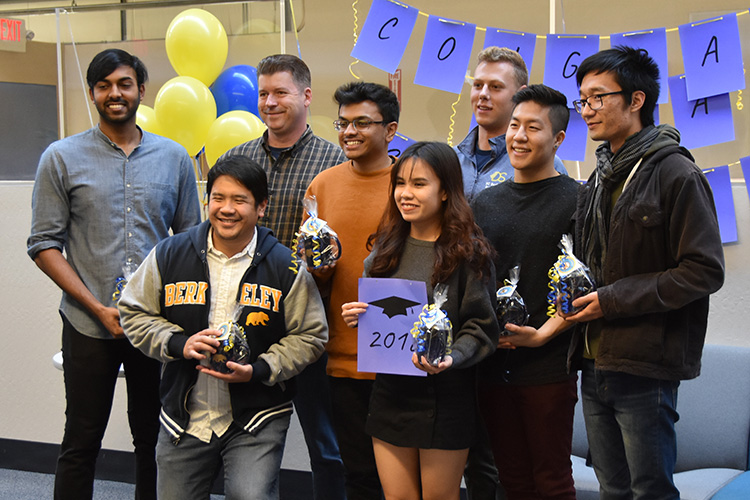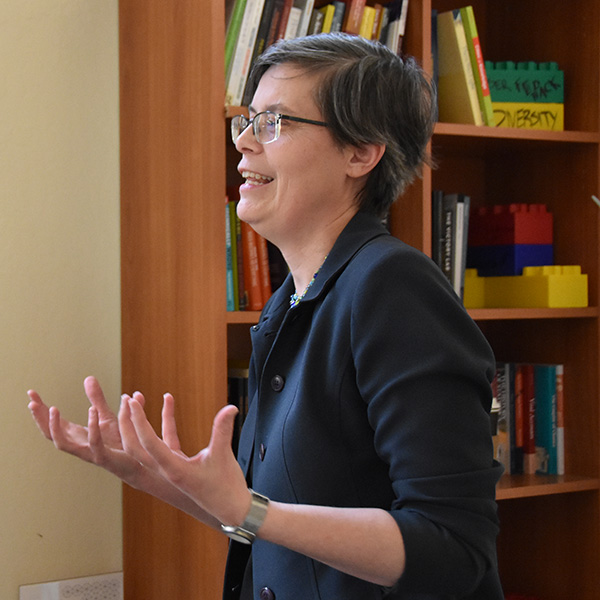UC Berkeley’s first data science majors celebrate graduation
Students are flocking to the brand-new degree program in record numbers
December 13, 2018

Eight of the nine data science majors who will graduate on Saturday gathered in the Division of Data Sciences on Friday to celebrate their achievement. From left: Jeevan Reddy Mokkala, Emanuel Lucban, Adam Osborn, Nikhil Krishnan, Thao Vo, Alexander Ivanoff, Liam Shi and Howe Cui. Not pictured: Ting Chih Lin. (UC Berkeley photo by Hulda Nelson)
Alexander Ivanoff couldn’t get enough data science.
After taking the introductory course Foundations of Data Science (Data 8) in the fall semester of his sophomore year, the UC Berkeley senior wanted to find out where else the numbers could take him. He also wanted to spread his new enthusiasm for data with other students, especially those who may not consider themselves “number people.”
He paired up with Vinitra Swamy and faculty member Niek Veldhuis to form one of the first data science “modules” — teams of students and faculty collaborating to build computational teaching tools for subjects ranging from history to cognitive neuroscience – and within months was creating a new platform for students to analyze ancient Sumerian texts in Veldhuis’s Cuneiform languages class.
One of the tools they developed was a language analysis software that could help pinpoint where different characters appeared in various texts, unveiling clues about what the Sumerians thought was important, which characters were related and what they did.

Alexander Ivanoff credits his mom for encouraging him to take statistics (UC Berkeley photo by Hulda Nelson)
“Veldhuis took us to the anthropology museum and we got to literally hold ancient Sumerian clay tablets to connect on that next level with what they are doing,” Ivanoff said. “They showed me just how versatile data science tools were, which, combined with hearing about their capabilities in the news, made me really want to get involved more.”
On Saturday, Ivanoff will be one of nine students to graduate with a Bachelor of Arts in Data Science, the first set of degrees to be granted in this rapidly growing new major. Launched this fall, nearly 1,200 students have already filed pre-declarations for the major. Approximately 100 are expected to graduate with the degree this spring.
“The very first question on the very first day of the [pilot Data 8] class wasn’t ‘How are you going to grade the final,’ it was, ‘Will the data science major be ready in time for me to graduate?’” said David Culler, interim dean for data sciences, at an event to honor the majors on Friday.
A team was assembled over the summer to plan out the advising process for all the students, bringing together experience from across the campus. Hundreds of students got individual advising, which will allow them to navigate the expectations of the new major.
“I was originally a cognitive science and stats double major, and when they announced the data science major, I realized I could switch my do-it-yourself data science major to the actual data science major,” Ivanoff said.
The major is built upon a foundation of computer science, statistics and mathematics courses. But it doesn’t stop there. Each student is also required to specialize in a “domain,” which encourages them to apply their analytical skills to real-world problems. This year’s cohort graduates with domain emphases in cognition, computational biology methods, economics, robotics, social welfare, health and poverty, and applied mathematics and modeling.

Cathryn Carson speaks at an event to honor the majors on Friday. (UC Berkeley photo by Hulda Nelson)
Students say the wide breadth of applications of data science is one of the things they love about the field.
“Every time I have a new dataset I feel like I am learning something, and it makes me feel like I can always explore new things,” said Thao Vo, who chose applied math, modeling, and optimization as her emphasis.
And industry demand for tech-savvy graduates hasn’t hurt student enthusiam.
“I’m a big fan of the phrase ‘skate to where the puck is going,’” said Ivanoff, who will graduate with an emphasis in cognition. “To really be peak employable, I would want to get more technical skills under my belt, and it is great that they are already really applicable to the field that I wanted to study”
Student interest has propelled the creation of the major, said history professor Cathryn Carson, who leads the Data Science Education Program. In addition to building the module program, students have filled the first floor of Moffit Library with peer advisers and teaching consultants, and have created a host of student organizations that run workshops and industry events. They also have been essential in outreach, Carson said, helping attract new students to data science who might not feel welcome in technical fields.
“We knew that something real was going on in the outside world that the students were the signal of,” said Carson. “It took a lot of collaboration across the university, including the administration, and a lot of spurring by the students to put the major together.”

Emanuel Lucban hopes to pursue a graduate degree in data science. (UC Berkeley photo by Hulda Nelson)
Emanuel Lucban, a non-traditional student who has more than a decade of experience in web design and I.T., will also be celebrating graduation on Saturday. He was inspired to go back to school after reading a 2012 New York Times article about how a statistical model developed by Target analyzed purchasing behavior to accurately predict that a woman was pregnant before her family knew – and, conveniently, sent her coupons for prenatal vitamins.
“The capacity to record data has increased over the past decade, and now we are finding all sorts of uses for data — things that I never would have imagined, and it was just interesting to me what kinds of things we could infer from data,” Lucban said.
Lucban took computer science classes at a local community college before transferring to UC Berkeley in 2016. Though he started as a computer science major, Lucban jumped at the chance to get a degree in data science.
“I was really excited when I heard I about this new data science major opening up because that was my entire reason for going back to school — I eventually planned to leave here and then go to grad school for data science,” Lucban said.
“These students were motivated by their own desire to complete this major and their own sense that they could make it in the world,” Carson said. “They are a really special group.”
RELATED INFORMATION